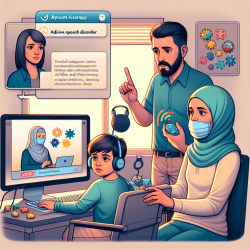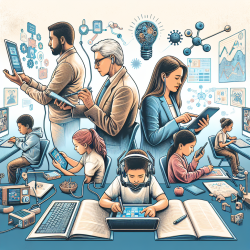Introduction
The COVID-19 pandemic has been a challenging time for everyone, but for families with children with Autism Spectrum Disorder (ASD) and other developmental disorders, the impact has been particularly profound. A recent study titled "Parental Views of Families of Children with Autism Spectrum Disorder and Developmental Disorders During the COVID-19 Pandemic" sheds light on the experiences of these families during the lockdown in Turkey. This blog aims to explore the findings of this study and provide insights for practitioners looking to improve their skills and support these families more effectively.
Key Findings from the Study
The study utilized a mixed-methods approach, combining qualitative and quantitative data, to explore the effects of the pandemic on family functioning. Here are some of the key findings:
- Increased Family Interaction: Many parents reported spending more time with their children, which led to increased family interaction and improved relationships, particularly between fathers and their children.
- Unmet Educational Needs: A significant concern for parents was the interruption of educational services, which were crucial for children with ASD and other developmental disorders. The lack of face-to-face education and behavioral support posed challenges for these families.
- Positive Behavioral Changes: Despite the challenges, some parents observed positive changes in their children's behavior, such as increased verbal communication and self-care skills.
Implications for Practitioners
For practitioners working with children with ASD and their families, these findings offer valuable insights:
- Focus on Family Dynamics: The increased time families spent together during the pandemic highlighted the importance of family dynamics. Practitioners should consider incorporating family-based interventions that strengthen these relationships.
- Address Educational Gaps: The unmet educational needs of children with ASD during the pandemic emphasize the need for innovative solutions. Online therapy services, like those offered by TinyEYE, can play a crucial role in bridging this gap.
- Encourage Positive Behavioral Changes: Practitioners should build on the positive behavioral changes observed during the pandemic by reinforcing communication and self-care skills in therapy sessions.
Encouraging Further Research
The study also underscores the need for further research to fully understand the pandemic's long-term impact on families with children with ASD. Practitioners are encouraged to engage in research activities that explore new therapeutic approaches and interventions tailored to these families' unique needs.
Conclusion
The COVID-19 pandemic has brought both challenges and opportunities for families with children with ASD. By understanding the experiences of these families, practitioners can better support them and create positive outcomes. For those interested in delving deeper into this research, the original study can be accessed here: Parental Views of Families of Children with Autism Spectrum Disorder and Developmental Disorders During the COVID-19 Pandemic.










